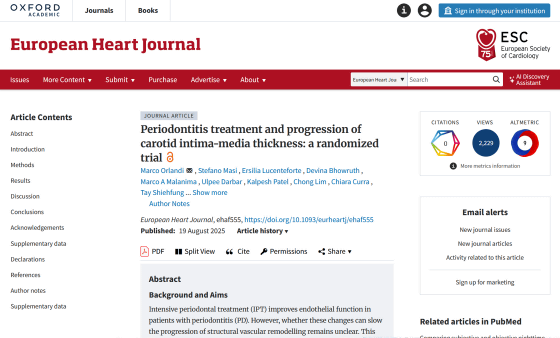Research results show that treating periodontal disease may reduce the risk of arteriosclerosis

Previous research has shown that dental health is linked to the risk
Periodontitis treatment and progression of carotid intima-media thickness: a randomized trial | European Heart Journal | Oxford Academic
https://academic.oup.com/eurheartj/advance-article/doi/10.1093/eurheartj/ehaf555/8237946

Getting gum disease treatment may protect your arteries, study finds | Live Science
https://www.livescience.com/health/heart-circulation/gum-disease-treatment-slows-the-thickening-of-arteries-clinical-trial-shows
Periodontal disease is a chronic inflammatory disease caused by bacterial infection of the gums, which, as it progresses, can cause problems such as loose teeth, tooth loss, and persistent bad breath. As periodontal disease worsens, pockets around the teeth that cannot be reached with a toothbrush or dental floss expand, allowing plaque and bacteria to accumulate.
Furthermore, numerous studies have shown that periodontal disease can cause health problems such as Alzheimer's disease, colon cancer , and rheumatoid arthritis , and a link between severe periodontal disease and cardiovascular disease has also been pointed out. Since it is estimated that 40% of adults over the age of 30 in the United States suffer from periodontal disease, it is important to understand the impact that periodontal disease treatment can have on other diseases.

A research team led by Dr.
To investigate the relationship between periodontal disease and carotid artery thickening, a team of periodontists and cardiologists conducted a randomized controlled trial at a central London dental clinic. First, 135 patients with severe periodontal disease underwent carotid artery ultrasound to measure baseline artery thickness.
The researchers also measured how well arteries dilated when blood flow increased, and took blood samples to identify markers of inflammation and oxidative stress. All of the subjects had periodontal disease but were otherwise healthy.
The subjects were then divided into treatment and control groups, evenly matched for factors such as the severity of their periodontal disease, smoking status, and family history of cardiovascular disease. Patients in the treatment group received intensive periodontal treatment, including a thorough cleaning of the entire mouth and deep-gingival cleaning to remove plaque and tartar. Patients in the control group received plaque and tartar removal, similar to a regular dental cleaning, but without deep-gingival cleaning.
The participants were followed for two years, during which they received regular dental care. The researchers performed carotid ultrasound scans at one and two years and measured the health of their blood vessels by taking blood samples at five time points.

The study found that subjects who received intensive periodontal treatment had thinner inner layers of their carotid arteries than the control group. Study co-author Francesco Daiuto , a periodontist at University College London, explains that the difference between the treatment and control groups was comparable to that seen with lifestyle interventions and some medications in similar populations.
Treated patients also experienced improved vascular function and reduced levels of inflammatory and oxidative stress markers in their blood, factors known to influence atherosclerosis , the narrowing of arterial walls.
'Our findings strengthen the notion that untreated periodontal disease is a modifiable risk factor for vascular aging and cardiovascular disease,' said Daiwoot. However, because this study was localized, the results may be partially influenced by location and sample bias.
Maurizio Tognetti , a periodontist at the University of Hong Kong who was not involved in the study, also pointed out that the results of the study do not mean that treating periodontal disease will improve the health of patients with arteriosclerosis, because all of the subjects were otherwise healthy.
'These findings bridge the concept of treating severe periodontal disease to the field of health maintenance,' Tognetti said. 'For many years, dentists have focused on the teeth and forgotten about the rest of the body, and surgeons have focused on the body and forgotten about the teeth. These have been two separate worlds, but they need to be reunited for the benefit of patients.'
Related Posts:
in Free Member, Science, Posted by log1h_ik







